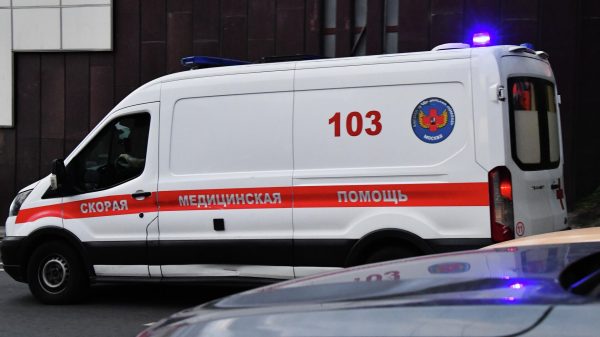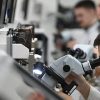
MOSCOW, January 11 Russian cosmonautics in the coming The year is expected to pass a number of turning points: in particular, launches of the Angara rocket will begin from the Vostochny Cosmodrome, and the first satellite of the Marathon Internet of Things constellation will also be launched.
Read about the most expected events in the field of Russian cosmonautics in 2024 in the material.
The heaviest in the Far East
The first launch of the Angara-A5 heavy rocket from the launch complex at the Vostochny Cosmodrome is planned for the first quarter of 2024. As Roscosmos General Director Yuri Borisov announced shortly before the New Year, the launch complex is almost ready, and launch is possible as early as March.
Infrastructure for Angara missile launches at Vostochny has been under construction since 2018. In November-December 2023, tests were carried out there using an electric refueling mock-up called «Angara-NZh» (a complete copy of the rocket with all the systems used in preparation for launch).
The rocket was sent for the first launch at the end of December last year, and on January 9, Roscosmos announced that it had already been delivered to the cosmodrome. Earlier, the Orion upper stage also arrived at Vostochny for comprehensive tests of the cosmodrome and flight tests of the Angara.
«Angara» is a new generation of Russian modular launch vehicles, developed on the basis of two universal rocket modules (URM) with oxygen-kerosene engines: URM-1 and URM-2. The Angara family of launch vehicles will in the future include carriers from light to heavy classes with a payload range from 3.8 to 35 tons.
To date, there have been three launches of the light one (the first in July 2014) and three launches of the heavy Angara, all of which took place from the Plesetsk cosmodrome in the Arkhangelsk region. So far, 14 launches of the Soyuz-2.1a and Soyuz-2.1b medium-class rockets have taken place from Vostochny.
Replenishment of the group of demonstrators
Another important event for Russian cosmonautics will take place at the cosmodrome in the Amur region in 2024. It is planned that the first satellite, a technology demonstrator for the Marathon Internet of Things constellation, will be launched from here.
It is assumed that the full-scale orbital constellation «Marathon IoT» will consist of 264 devices in orbits at an altitude of 750 kilometers in 12 planes with a circumpolar inclination. This will make it possible to provide data services throughout the Earth.
In September 2023, Roscosmos signed a contract with the satellite manufacturing company Reshetnev to create the first satellites of this constellation. The company's specialists will develop and manufacture five experimental Marathon satellites, and then gradually create 132 regular satellites, which will make up half of the system's orbital constellation. The Marathon constellation will be part of the Sfera multi-satellite system.
This project is designed to provide Russians with the Internet of things, as well as communications in remote areas of Russia, in particular in the Arctic. The developers place special emphasis on ensuring communications on the Northern Sea Route. The first vehicle of the group, the Skif-D technology demonstrator, was launched on October 22, 2022 from the Vostochny Cosmodrome.
According to Roskomos General Director Yuri Borisov, the minimum required Russian satellite constellation by 2030 should consist of 1000-2000 devices. To do this, by 2025 it is necessary to produce 250 satellites per year, and by 2030 — one satellite per day. For comparison, as of June 2023, the Russian orbital constellation consisted of 225 satellites.
Not a year without a record
Russian cosmonaut, commander of the cosmonaut corps Oleg Kononenko in 2024 will become the first earthling in the world to spend a total of more than a thousand days in space. He set off on his fifth flight together with another Russian cosmonaut Nikolai Chub and American Loral O'Hara on the Soyuz MS-24 spacecraft on September 15, 2023.
On December 15, he had already moved from third to second place in the world in terms of total duration of space flights. On February 4, he will be ahead of Gennady Padalka, who still holds the championship (he spent more than 878 days in space). In early June, Kononenko will become the first person to fly more than 1,000 days in space, which is comparable to the duration of two flights to Mars and back.
The record-breaking cosmonaut will return to Earth in September along with Chub and American Tracy Dyson. She will arrive in March on the Soyuz MS-25 spacecraft with Russian cosmonaut Oleg Novitsky and cosmonaut from Belarus Marina Vasilevskaya. O'Hara, Novitsky and Vasilevskaya will descend to Earth after a short-term mission and leave their ship to Kononenko, Chuba and Dyson.
Thus, O'Hara's expedition to the ISS will last 192 days, and Kononenko and Chuba — 375 days. After completing his fifth flight, Kononenko will spend a total of 1,111 days in space.
It is noteworthy that Russian cosmonauts Sergei Prokopyev, Dmitry Petelin and American astronaut Frank Rubio also set a record in 2023, only for the duration of the mission to the ISS. They spent 371 days at the station, thus exceeding the duration of the expedition of cosmonaut Pyotr Dubrov and astronaut Mark Vande Hei, who flew for more than 355 days.
It was originally planned that Prokopyev, Petelin and Rubio would spend six months at the station, but they had to be delayed due to the depressurization of their Soyuz MS-22 spacecraft. It was lowered from orbit without a crew, and the next ship, the Soyuz MS-23, was sent to return to the station.
Return from the Moon
For almost the entire year 2024, the Institute of Medical and Biological Problems (IMBP) of the Russian Academy of Sciences will conduct an experiment to simulate a flight on Luna crew of six. The team as part of the SIRIUS-23 experiment was locked in the Institute's ground test complex on November 14, 2023.
The crew included five Russians: crew commander Yuri Chebotarev, flight engineer Anzhelika Parfyonova, doctor Ksenia Orlova, as well as researchers Ksenia Shishenina and Rustam Zaripov. Another researcher is the representative of Belarus Olga Mastitskaya.
According to the experiment scenario, the crew “reached” the lunar orbit in four days and “docked” to the lunar orbital station, and a month later a retrofitting transport ship “arrived” to them, work with which took two days.
It is planned that the participants will gather in groups of four people five times and in this composition “land” on the surface of the Moon. The return “flight” to Earth will begin on the 362nd day of the mission. The “return” will take four days. In addition, during the experiment, emergency situations will be simulated for its participants.
It is expected that participants from India, the Czech Republic, Turkey, Italy, Canada, Malaysia, the United States and Korea will participate in the experiments during the year-long study.
Some of the experiments will be devoted to practical medicine for future use on Earth; 18 experiments in psychology and 11 experiments in microbiology will be conducted.
The SIRIUS-23 experiment should be completed exactly one year after it began. Previously, IBMP had already conducted similar “Sirius” trials lasting 17 days, 4 and 8 months. In addition to the Russians, researchers from the USA, Germany and the UAE took part in them, but NASA took a break in 2023.
Mice in orbit of the new station
In addition, IBMP plans to launch the Bion-M biosatellite No. 2 into orbit in 2024. The previous flight of a similar device took place more than 10 years ago — in 2013, Bion-M No. 1 was launched. Previously, as part of the Soviet Bion program, 11 vehicles flew into space with plants and animals on board from 1973 to 1996.
«Bion-M» No. 2 with 75 mice, as well as plants and microorganisms, will go into a high-latitude orbit similar to the one on which the new Russian Orbital Station (ROS) will subsequently be built. The goal is to study the radiation effects that astronauts will be exposed to on this flight path around the Earth.
In particular, scientists are going to check which microorganisms are capable of surviving entry into the atmosphere from outside the apparatus, that is, roughly speaking, whether they can get to the planet on a meteorite. In addition, Bion-M No. 2 will conduct an experiment on creating the “building blocks” of life — amino acids, carboxylic acids, nucleic bases and sugars in outer space.
The launch is planned for July 31, 2023, the flight time should be about a month. Moreover, delays in sending the device are extremely undesirable for scientists, because in this case, the return of Bion-M No. 2 to Earth could occur in the fall, when the weather in the Kazakh steppe will be unfavorable for animals flying into space.
< span class="share" data-nosnippet="true" data-id="1917372146" data-url="https://ria.ru/20231222/orbitalnaya_stantsiya-1917372146.html" data->






















































Свежие комментарии